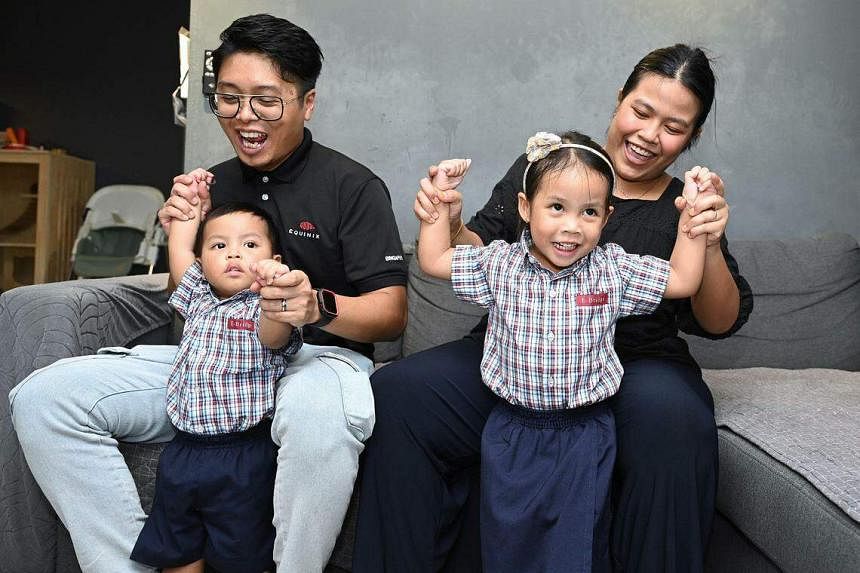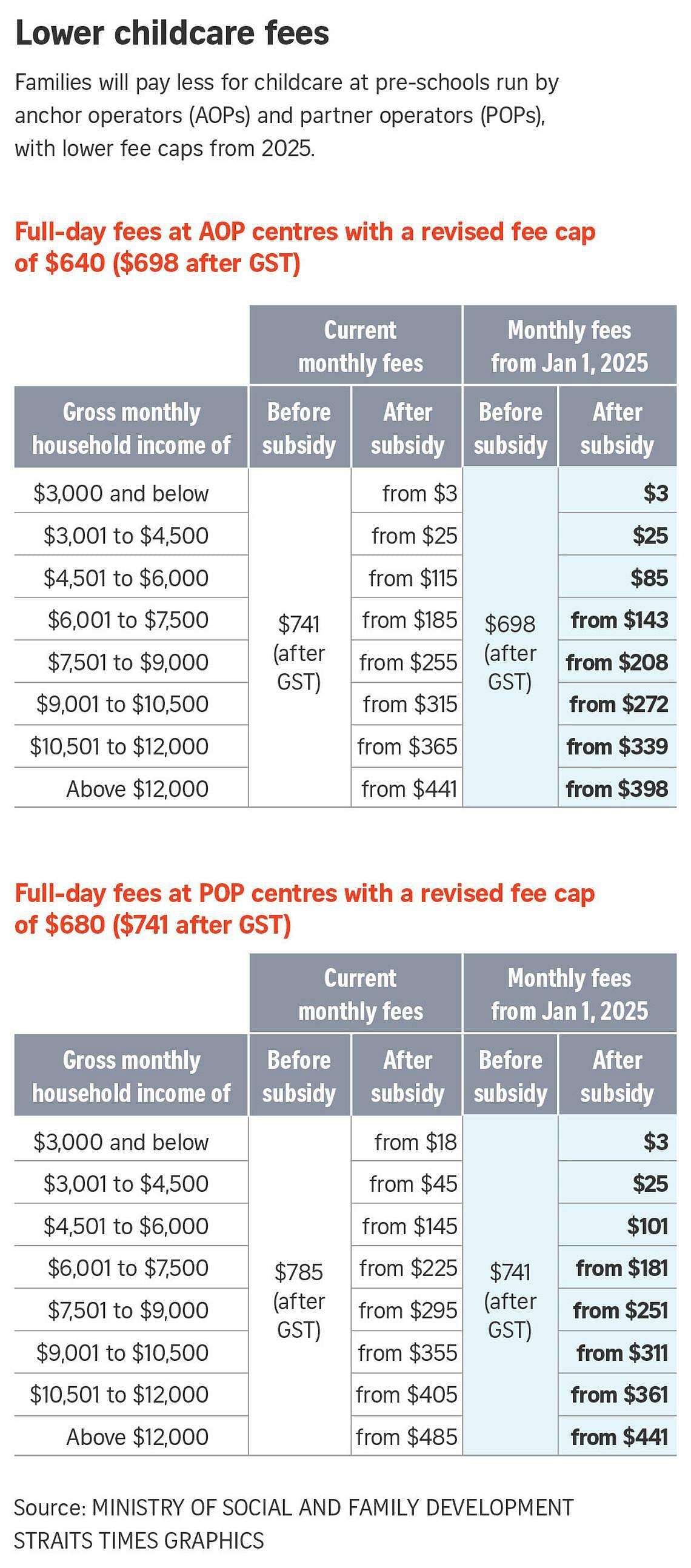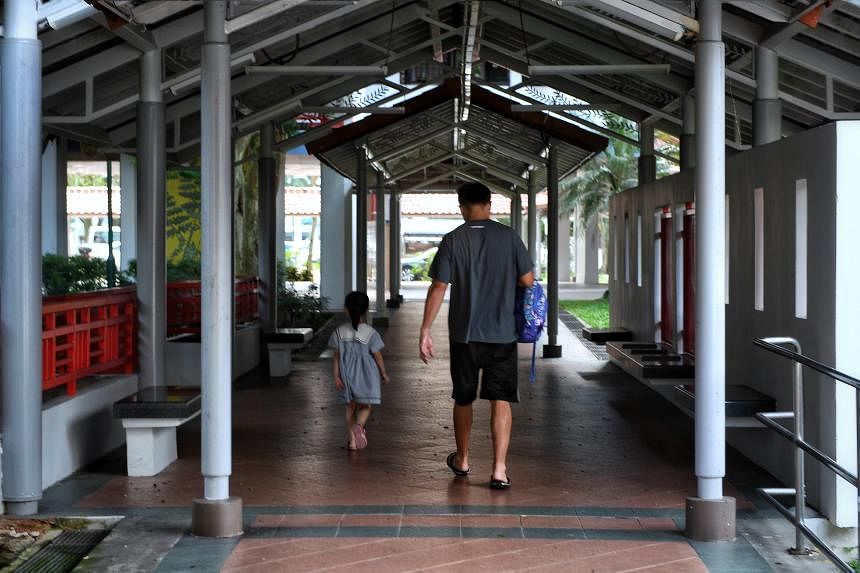SINGAPORE - Pre-school will be made more affordable with the introduction of lower school fee caps in 2025 and greater support for more lower-income families from the second half of 2024.
Outreach efforts to encourage such families to enrol their children in pre-schools by the age of three will also be expanded.
Facilitating access to affordable pre-school education will give children from lower-income families a strong start and improve their school readiness, said Minister for Social and Family Development Masagos Zulkifli on March 6.
In 2025, the fee cap for full-day childcare will drop by $40 a month to $640 at the five anchor operators, and $680 at 28 partner operators. After existing basic and means-tested subsidies, most families will pay between $3 and $441 a month for childcare.
Around 95,000 children will benefit from this, said Minister of State for Social and Family Development Sun Xueling at the debate on her ministry’s budget.
From the second half of 2024, lower-income families under the new ComLink+ scheme will be able to get a one-time $500 top-up to their children’s Child Development Account (CDA) when they turn three, and this can be used to pay pre-school fees.
In addition, those between the ages of three and six will get a $200 CDA top-up every three months if they attend pre-school regularly.
The new ComLink+ scheme was announced in November 2023 as part of the Forward Singapore report to help lower-income families with children. The ministry has set aside $250 million over the next three years for ComLink+.
Senior Parliamentary Secretary for Social and Family Development Eric Chua announced during the budget debate that the scheme will be extended to lower-income families that do not live in public rental flats.
Currently, only those residing in highly subsidised Housing Board rental flats qualify.
About 10,000 families have agreed to be part of the scheme, with the remaining 4,000 declining to take part.
Under the expansion, families with children will be eligible for ComLink+ if they are under the KidStart and Uplift Community Network programmes, both targeted at helping children from lower-income homes. Families do not need to be living in public rental flats to qualify for these programmes.
The expanded scheme aims to get around 3,000 families on board over the next few years, Mr Chua added.
He said: “In every society, there will be those who struggle from time to time. However, what really reflects our moral fibre as a society is how we work together to make sure that no one is permanently stranded at the bottom of the barrel.”
The scheme will introduce four packages to help families, focused on pre-school education, employment, debt clearance and saving for home ownership.
The package for pre-school education, where eligible families can get up to $3,700 worth of CDA top-ups for each child, is the first to be rolled out. The other packages will be rolled out progressively from 2025.
The CDA top-ups will be fully funded by DBS Foundation.
In his speech in Parliament on March 6, Mr Masagos said all lower-income families with a gross monthly household income of $6,000 and below will qualify for the maximum amount of childcare subsidies for their income tier by the end of 2024.
This means lower-income families with non-working mothers will receive the same subsidies as those with working mothers. Previously, lower-income families with working mothers received more subsidies compared with those with non-working mothers.
The move will cover roughly 20 per cent of Singapore households that have at least one pre-school-age child, said the ministry. Up to 17,000 more children will benefit from the higher subsidies.
Among those who could enjoy lower school fees for their children are Ms Iffah Sofiah, 28, and her husband Muhammad Imran Samuri, 33.
Mr Imran, a senior facilities engineer, is the family’s sole breadwinner and takes home between $4,000 and $5,000 monthly.

Ms Iffah took on caregiving duties for their children three years ago and has been a housewife since. She has been on the lookout for jobs, but has found it difficult to get one with flexible hours, so as not to compromise on quality time caring for her two children.
Their children, aged two and three, attend pre-nursery and nursery classes at E-Bridge Pre-School Bukit Batok West.
The couple pay $230 in school fees a month.
Ms Iffah is happy there will be more subsidies for families with non-working mothers.
She said: “This will help greatly to relieve the financial burden and pressure of raising children, as well as adjust to the rising cost of living in Singapore.”
From the third quarter of 2024, the Pre-school Outreach Programme will be expanded to more children from lower-income families to encourage and facilitate their enrolment into pre-school by the age of three.
Through the programme, introduced in 2007, outreach workers help families look for an affordable pre-school and assist in the enrolment process.

It aims to reach more than 2,000 children every year, said Mr Masagos. He added: “This will give these children a strong start and improve their school readiness and future educational outcomes.”
Currently, the pre-school enrolment rate of children aged three to four years old from lower-income families is around 78 per cent, about 10 percentage points lower than the national average.
The Early Childhood Development Agency will provide additional resources to anchor operator pre-schools from the second quarter of 2024, to help ensure that children from lower-income families attend school regularly.
For example, schools will monitor children’s attendance and work with their parents to address challenges they may face in taking their children to pre-school regularly.
Mr Masagos said pre-schools will also provide more targeted learning support to children who may need more help in areas such as literacy, numeracy and social emotional development.
The extra resources are expected to help close to 2,000 children in these pre-schools over the next three years.


